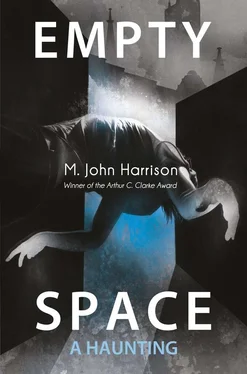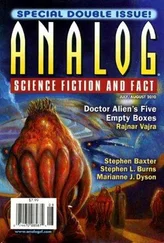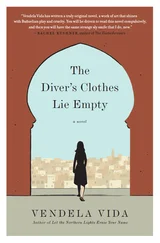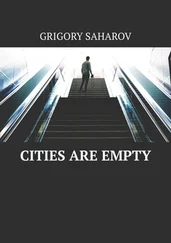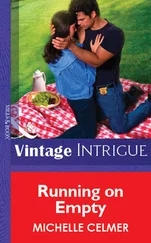‘James, you depressing animal,’ she said.
At nine, the telephone rang. She picked it up expecting Marnie again, but there was no one at the other end. Just as she put the receiver down, she heard an electronic scraping noise, like starlings in a gutter; a distant voice which shouted, as if to a third person even further away than Anna:
‘Don’t go in there!’
When the cat hadn’t come in by ten o’clock, she went out to look for it.
The air outside seemed even warmer. There was no moon. Instead the summer constellations wheeled above the water meadow. Anna made her way slowly down the lawn, and imagined she saw the cat’s eyes glittering ironically at her from the base of the hedge. ‘James?’ Nothing, only the grey earth still disturbed and scattered about. A strip of orchard ran down one side of the garden, old apple varieties left to themselves to split and fall apart from the centre outward so that their moss-covered boughs curved back down to the ground. The cat would often crouch among them at night; listen for bank voles; chase a moth. He wasn’t there now. Anna balanced her wine glass in the crook of a branch, let herself out through the side gate. ‘James? James!’ she called, all the way across the pasture to where the river, glimmering in the starlight, wound between crack-willow and beds of nettle in soft black earth. Anna, ambushed and thoughtful, stood gazing into the water. Where in daylight it would be solid and brown, with a glassy turbulence at the surface, now it seemed fine-grained, weightless. She trailed her hand. She forgot the cat. She laughed. Suddenly she sat down on the bank and and took off her shoes, and was about to take off her clothes, when something — she wasn’t sure what, it might have been the slightest shift of light on the willow leaves — caused her to turn and look back the way she had come.
Her summerhouse was on fire.
Huge red and gold flames rose at an angle from its conical roof. There was no smoke; and though they cast a great light, and threw long oblique shadows across the pasture, the flames looked stiff, idealised, as though painted for a Tarot card. For a moment she saw herself on the card too, in the foreground but well to one side so that the focus remained firmly on the burning building (which could now be seen to be isolated in the field, with a suggestion of a hedge, or perhaps some kind of earthwork, at its base): a woman hard to age, wearing a 1930s-looking floral print dress, running with her mouth open and a paradoxical expression, a mask of dissociated consternation, on her face. No shoes. Her hair, flying back in the wind, painted as a single mass. Her lips were moving. ‘Go away. Go away from here!’ The flames roared silently up, amid showers of gold sparks. Anna could feel the heat of them, stretching the skin across her cheekbones. Yet by the time she reached the garden gate everything was dark again; and, despite the heat, nothing had been burned. There wasn’t even a smell of smoke — although through the summerhouse windows she glimpsed what looked like embers, still whirling about inside, just above the floor.
The door had dropped on its hinges a decade before. Anna dragged it open. Two or three houses’ worth of garden furniture and tools met her gaze. Tim had liked to garden. From an early age, Marnie had liked to help. They had liked to be in the garden together, around the flowerbeds or the kidney-shaped pond, while Anna watched with a drink. Deckchairs, sunshades, long-handled pruners. Marnie’s quite expensive ping-pong table. Then, in the shadows, shelves full of half-used garden chemicals. The chemical smells of dusts and powders, spilled across the floor or gone solid in their tins and packets. Then the smell of cardboard boxes, lax with damp, bulging with everything from photograph albums to ornaments. Something was spilling off the shelves, in a shower of fantastic sparks! They were just like the sparks from a firework! They paled slowly but didn’t fade. Anna approached. She let them fall through her upturned hands. She sat on the floor and sifted through them like a child. Light dripped off her fingers, soft-feeling embers like cool sachets of gel, the neon colours of the organs the cat brought in. After a time these colours leached away, just exactly like heat from embers, to leave a drift of small objects she could barely make out in the dark. Anna sorted through them. She turned them over uncomprehendingly. She found a shoebox, green, a trusted brand, and shovelled them into it. Opening the summerhouse door she had thought she heard sounds: laughter, music, the smells of fried food, alcohol and human excitement in a seaside at night. She rubbed the palm of her left hand with the thumb of her right. Presently, she went outside and looked across the river pasture, where her own running footprints made an erratic track through the thick dew.
‘Michael?’ she called softly. ‘Michael?’ She called, ‘Is this you? Are you doing this? Michael this is you, isn’t it?’
She slept heavily and did not dream. The next morning, she drank a cup of weak green tea; ate a dessert spoon of honey stirred into Greek yoghurt; upended the shoebox across the kitchen counter and watched its contents bounce and roll. They were just small things — ordinarily tawdry but in resonant colours — which she thought must once have belonged to Marnie. She stared at them, strewn across the counter like coloured buttons. Some of them were buttons, in different shapes and sizes. Some of them were more like old-fashioned enamel badges — emblems of someone’s miltary career, or a life in nursing or conducting buses, brought up short by pancreatitis or stroke in the early 1970s. There were things that resembled Lego bricks, made of a translucent material too substantial to be plastic; two or three pinchbeck rings with interesting symbols; a cluster of tiny porcelain rosebuds you could pin to a frock; beads, charms, iron-on tattoos, yellowing dice and a pair of moulded plastic lips at the very beginnings of a kiss. Miniature playing cards slipped from a pasteboard box. There was a plastic mug with a mirrored bottom, so that when you drank from it your own face was revealed. A little red Valentine’s heart with diodes inside that even now lit up when Anna pressed the tiny button on the back — although God knew how old it must be. They were the kinds of things that turn up in trays at flea markets. Costume jewellery fallen out of a Christmas cracker thirty years before. Anna was compelled. She phoned Marnie and they had another disagreement.
‘But do try and remember,’ Anna urged. ‘Little 3D pictures! And enamel badges like the ones you wore when you were at Cambridge.’
‘Anna,’ Marnie said, ‘It is five o’clock in the morning.’
‘Is it, darling?’ Anna said. ‘I thought they were just the type of thing a child might collect,’ she tried to explain. ‘I thought you’d be interested.
‘Do you know something?’ she said. ‘Some of them are warm !’
‘Hang up, Anna,’ Marnie advised. ‘I am.’
Anna stared at the items for some minutes, as if they had given her a new lease of life. Then she fetched her handbag from the hall and out of it, after some rummaging, took out Michael Kearney’s pocket drive. This she put down among all the other stuff, where the light could shine off its slippery titanium surface. While she was staring at it, James the cat came in and began butting and fussing around her calves, his purr thick and close, breathy and mechanical at the same time. Suddenly he went to his bowl and began to eat tuna as if his life depended on it. The milkman left the milk. A train went past on the valley line. The phone rang again. She wondered what had really happened to the summerhouse in the night: everything had remained perfectly silent throughout, she thought, like a fire in a difficult film. She wondered what had happened to her. Eventually, she swept everything back into the shoebox, put the pocket drive in her bag, and caught the next train up to London, where she expected to spend the afternoon nosying into other people’s houses. For once she rather looked forward to it.
Читать дальше
